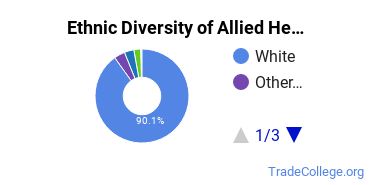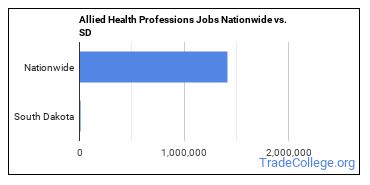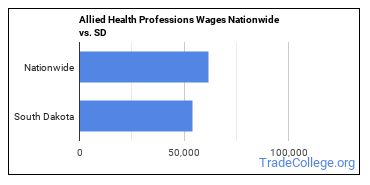Find Trade Colleges
Allied Health Professions Schools in South Dakota
228 Allied Health students earned their degrees in the state in 2021-2022.
An Allied Health Professions major is the 2nd most popular major in this state.
Featured schools near , edit
Education Levels of Allied Health Professions Majors in South Dakota
Allied Health majors in the state tend to have the following degree levels:
| Education Level | Number of Grads |
|---|---|
| Associate Degree | 114 |
| Award Taking 1 to 2 Years | 37 |
| Award Taking 2 to 4 Years | 37 |
| Bachelor’s Degree | 24 |
| Award Taking Less Than 1 Year | 6 |
Gender Distribution
In South Dakota, a allied health major is more popular with women than with men.

Racial Distribution
The racial distribution of allied health majors in South Dakota is as follows:
- Asian: 0.9%
- Black or African American: 0.0%
- Hispanic or Latino: 2.2%
- White: 93.0%
- Non-Resident Alien: 0.4%
- Other Races: 3.5%

Jobs for Allied Health Professions Grads in South Dakota
In this state, there are 4,580 people employed in jobs related to an allied health degree, compared to 1,414,230 nationwide.

Wages for Allied Health Professions Jobs in South Dakota
A typical salary for a allied health grad in the state is $54,290, compared to a typical salary of $61,540 nationwide.

Most Popular Allied Health Professions Programs in SD
There are 10 colleges in South Dakota that offer allied health degrees. Learn about the most popular 10 below:
The student to faculty ratio is 12 to 1. The 0.80% student loan default rate is lower than average. This public school has an average net price of $16,445.
The student to faculty ratio is 13 to 1. Graduates earn an average $34,739 after graduation. 97% of students get financical aid.
Of all the teachers who work at the school, 73% are considered full time. Roughly six years after entering college, graduates of this school earn $39,988 a year. This public school has an average net price of $14,595.
Seeking financial aid? At this school, 94% of students receive it. The full-time teacher rate is 79%. This public school has an average net price of $18,402.
Grads earn an average early-career salary of $41,842 after earning their degree at this institution. 91% of students get financical aid. Students who attend this public school pay an average net price of $13,034.
4 to 1 is the student to faculty ratio.
The student to faculty ratio is 12 to 1.
100% of students get financical aid. 17 to 1 is the student to faculty ratio. 100% of the teachers are full time.
Students enjoy a student to faculty ratio of 11 to 1. Grads earn an average early-career salary of $51,793 after earning their degree at this institution. 53% of the teachers are full time.
Students enjoy a student to faculty ratio of 11 to 1.
Allied Health Professions Careers in SD
Some of the careers allied health majors go into include:
| Job Title | SD Job Growth | SD Median Salary |
|---|---|---|
| Diagnostic Medical Sonographers | 22% | $61,100 |
| Cardiovascular Technologists and Technicians | 17% | $46,750 |
| Magnetic Resonance Imaging Technologists | 14% | $59,590 |
| Health Technologists and Technicians | 14% | $53,550 |
| Surgical Technologists | 14% | $39,990 |
| Nuclear Medicine Technologists | 13% | $65,190 |
| Emergency Medical Technicians and Paramedics | 11% | $30,360 |
Related Majors in South Dakota
Below are some popular majors in the state that are similar to allied health.
| Major | Annual Graduates in SD |
|---|---|
| Nursing & Nursing Assistants | 245 |
| Health Sciences & Services | 127 |
| Allied Health Services | 123 |
| Clinical/Medical Laboratory Science | 121 |
| Health/Medical Admin Services | 115 |
| Dental Support Services | 79 |
| Mental & Social Health Services | 59 |
| Bodywork & Therapeutic Services | 21 |
View all majors related to Allied Health Professions
Explore Major by State
Alabama
Arkansas
Connecticut
Florida
Idaho
Iowa
Louisiana
Massachusetts
Mississippi
Nebraska
New Jersey
North Carolina
Oklahoma
Rhode Island
Tennessee
Vermont
West Virginia
View Nationwide Allied Health Professions Report
References
More about our data sources and methodologies.




